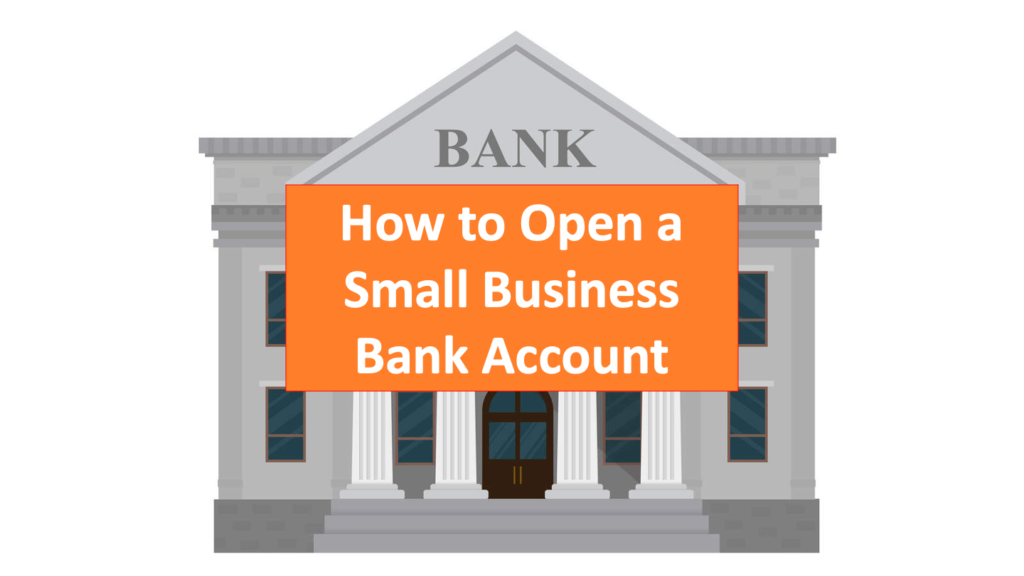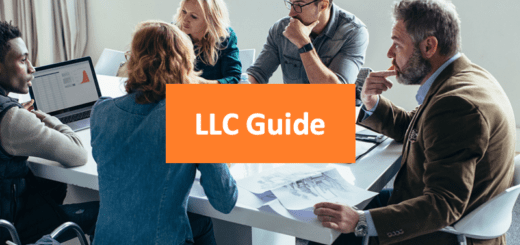How to Open a Small Business Bank Account
Table of Contents
Wondering how to open a bank account for a small business? Read this simple guide about how to open a small business bank account.

Running a business is both exciting and daunting. In addition, self-employed and independent contractors, often reach a point where they ask themselves, do I need a business bank account? This quickly leads them to wonder how to open a small business bank account. In this article, we make it simple to understand how to open a small business bank account. Keep reading to find out.
A small business bank account is a great way to keep your company finances separate from your personal finances. There are many benefits of having a business bank account. However, if you’re a sole-proprietor you’re likely working by yourself so it is not required.
Opening a small business bank account is easy. It typically takes a few minutes to open an account and many banks allow you to open a small business bank account online. Opening a business bank account should be an easy process as long as you have everything you need to be prepared in advance.
Do I need a business bank account?
Anyone who operates a business should open a business bank account. This includes everything along the spectrum of operating a business. From incorporations such as C corps to sole proprietors and self-employed individuals. In addition, the IRS recommends that all small businesses open a bank account. There are many benefits of a business bank account.
Do I need a business bank account for LLC?
Businesses aren’t necessarily required to open a business bank account in most cases. However, for incorporations such as a C corp or LLC, the need to open a business bank account is most obvious.
Below are two reasons a business needs a bank account.
Corporations are Independent Entities
Corporations are not individuals.
As independent entities, corporations have their own tax ID number. This means when it’s time to do corporate taxes there are specialized and dedicated forms that corporations fill out to report their business income, business losses, and business expenses.
For example, most LLCs and C corps complete their tax on IRS Form 1120.
With that said, it would make sense that business income and expenses are managed in a separate, business bank account, rather than in an individual consumer checking account.
Corporations with More than One Owner
Many incorporations have more than one owner or partner. A business bank account would make it easier to provide access to more than one person.
Do I need a business bank account for a sole-proprietorship?
The need for a business bank account for sole-proprietors and independent contractors are often not as clear.
Independent contractors, also often called sole proprietors, work for themselves. They’re not employees at companies. Instead, they’re individuals that are employed by one, or many companies or other individuals—often these are called their clients or customers. At the end of the year, an independent contractor receives a 1099 form from each of their ‘clients’. On their 1099 form(s) is the total income that they add to their tax return.
Sole proprietors and independent contractors are not required to have a business bank account. However, we recommend that they have one.
What do I need to open a business bank account?
When you open a business bank account, whether online or in-person, there are a few items you will need. It’s important to gather these items before you go to open your account, especially if you’re going in person to the bank, to open your account.
Here is the show list of what is needed to open a small business bank account. Below this shortlist is a detailed description of each of the items, where to get them and what they are (if you don’t already know).
- EIN or SSN
- Personal Identification Documents
- Business Formation Documents
- Business License (if required)
- Ownership Agreements
- DBA (Doing Business As)
EIN or SSN
Many small business owners and sole proprietors don’t have employees or a corporation. Therefore, the only identification number they have is a Social Security Number.
Most sole-proprietors and independent contractors use their SSN numbers to do business. An independent contractor or freelancer can find their Social Security Number in the upper right corner of their 1099 forms, which they receive from their employers and clients.
However, some business owners have an EIN. An EIN is also known as an Employer Identification Number or a Federal Tax Identification Number.
What is an EIN?
An EIN is an Employer Identification Number issued by the IRS for the identification of a business. The IRS also uses EIN numbers to keep track of a business’s tax reporting. An EIN is a nine-digit number that looks like a Social Security Number.
You need documentation of your SSN or EIN number, whichever one you choose to use, in order to open a business bank account. Your EIN or SSN number serves as proof of identification.
Personal Identification Documents
In addition to an EIN or SSN, when opening a business bank account you need to bring a personal identification document.
Personal identification documents include a State driver’s license, state ID, or a US Passport.
Banks most often require proof of identity to deposit funds or open a bank account. This is particularly true if you don’t already have a bank account or former relationship with the bank where you want to open your business bank account.
Business Formation Documents*
Some freelancers and sole-proprietors have officially registered their business as an incorporated entity. The most common business entity that sole-proprietors and small business owners form is an LLC. An LLC is also known as a Limited Liability Corporation. However, there are other types of businesses entities that a sole-proprietor or freelancer has created. For example, a small business owner might have created a C corp or an S corp. A C corp is the most complex of all business structures.
There are many online resources to help with incorporating and forming an LLC or other type of business entity. Also, consulting with an attorney is beneficial. A lawyer can help with incorporating, especially for more complex business structures.
*This does not apply for sole proprietors, sole proprietors don’t have business formation documents.
Pro Tip
Incorporating in Delaware or Wyoming is worth consideration. These two states are for being business-friendly, with low taxes and fees, and ease of management. However, if your business operations are mainly done in person, it may be required to incorporate in your state of residence.
You receive incorporation documents when you incorporate. This is true if you incorporate an LLC, S corp, or any other type of business entity.
When you open a business bank account you need to provide the bank with your business formation documents.
Business License
Your state may require you to have a business license depending on the nature of your business.
What is a business license?
A business license is issued by your state. A business license gives you permission from your state or municipality to do business in the location where you do business.
You’re probably wondering, am I required to have a business license?
The good news is, not all business types are required to have a business license. Also, the requirements to get a business license vary from city and state to state. It’s much harder to get a business license in some locations than others.
When you open a business bank account you need to provide a copy of your business license if you have one.
Ownership Agreements*
Your articles of incorporation will specify who owns your business. For businesses that are partnerships, it is important to have a partnership agreement.
What is an Ownership Agreement?
An Owners Agreement is a document between the owners of a company. Businesses with one owner also have ownership agreements.
This agreement specifies how to manage the business, who owns the business, and how much of the business each person owns. Depending on the structure of the business sometimes these agreements are called Buy-Sell Agreements or Shareholders Agreements.
You need to show your business ownership agreement to the bank that you’re opening a small business bank account with. This is because the bank needs to know who owns that business that the business bank account is being opened for.
*This does not apply for sole proprietors, sole proprietors don’t have business formation documents.
DBA, “Doing Business As”
What is a DBA?
DBA stands for, Doing Business As. A DBA is any registered name that a business is operating under that is not its registered name.
In some states, businesses that are operating under different names than their registered name are required to register a DBA. Have your DBA registration documents handy when you open a business bank account.
Do I need an EIN to open a small business bank account?
You don’t need an EIN to open a business bank account. However, in the case that you don’t have an EIN you will have to use your Social Security Number (SSN).
How much money do I need to open a business account?
Typically you don’t have to pay any fee to open a business bank account. However, there might be a minimum deposit requirement.
Some banks don’t require any minimum deposit to open a business account. However, others require a minimum deposit of anywhere from $5 to $1,000 or higher.
How to open a free business bank account
As a sole-proprietor or small business owner you probably keep a close eye on fees, this would also include bank fees. With that said, most small business owners would prefer to open a business bank account with no fees.
While it likely doesn’t cost any money to open a business checking account, many mainstream bank accounts charge a monthly service fee. Also, some smaller banks do too.
Example fees a small business bank might charge:
- Monthly service fee
- Wire transfer fees
- Transaction fees (particularly for international purchases)
Therefore, when you’re researching small business banks make sure to keep an eye out for fees.
A great way to keep track of business expenses is with an expenses tracker app like Falcon Expenses.
Conclusion
Opening a business bank account is not a daunting and tedious task. Actually, it often doesn’t take much time at all. Also, with many banks, you can open a business bank account online, instead of going through the hassle of doing it in person.
Our only advice is this …
Make sure you prepare all the items we’ve listed above before you go to open your business bank account. Also, make sure you review the required documents your new bank requires to open a bank account (to make sure nothing is missing).
This will prevent any delays and ensure that the process of opening the account goes as smoothly as possible.
Good luck.
Was this article helpful?

I used to travel a lot for work. Doing my expenses frustrated me. I would delay submitting them and when I did, I would spend hours taping receipts to paper to scan for my boss. I knew there was a better solution, and I had a background in productivity software, so I created Falcon Expenses. I enjoy creating software that makes people’s lives easier.
In addition, I’m an avid skier and I enjoy hiking, sailing, and cooking.




